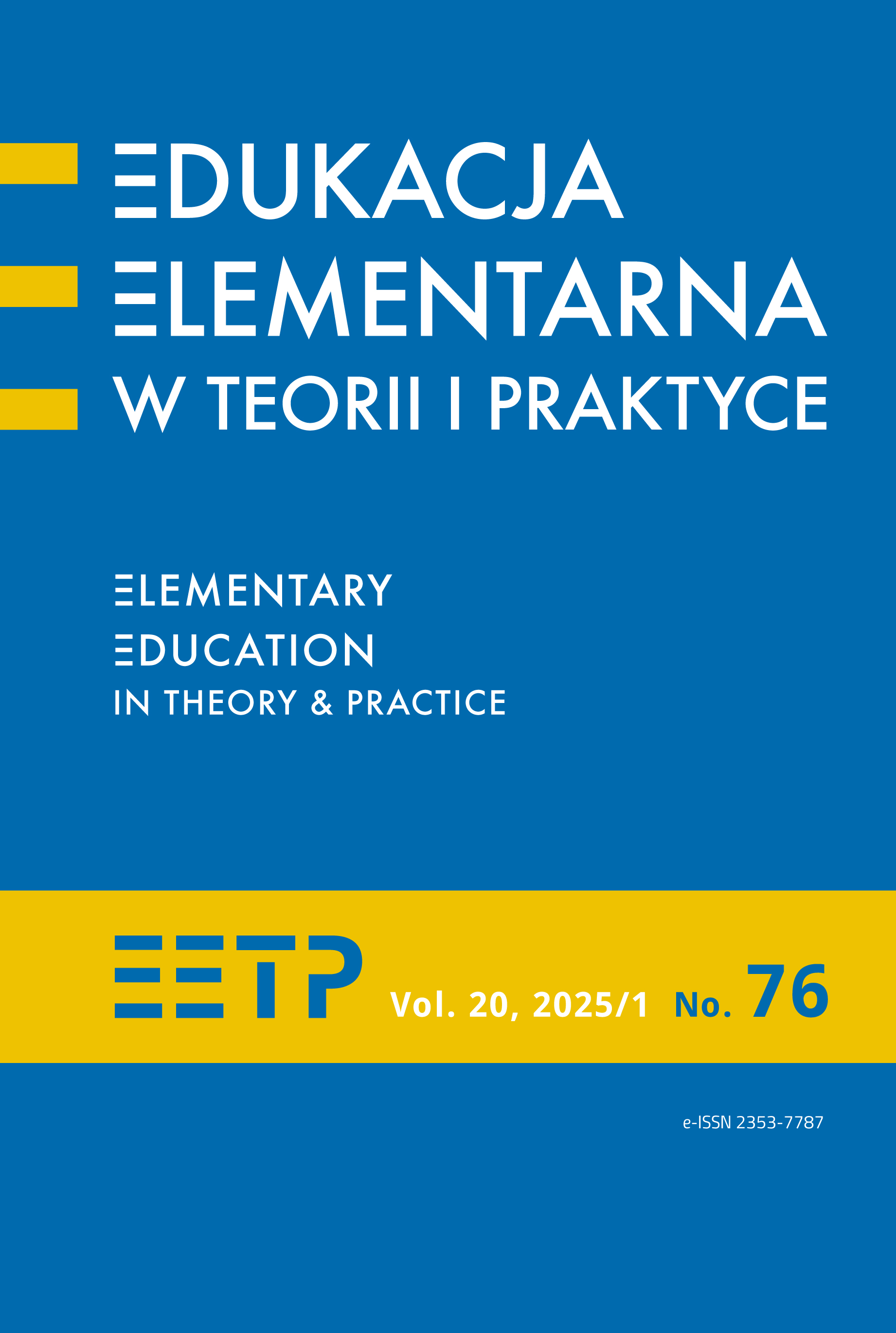O czym są przekonane nauczycielki wczesnej edukacji? – analiza deklaracji dotyczących wybranych aspektów związanych ze szkołą
Abstrakt
W artykule przedstawione zostały wyniki badań dotyczących przekonań, które mają znaczenie dla stylu pracy nauczyciela. Celem projektu było poznanie, opisanie i wyjaśnienie przesłanek myślowych na temat dziecka, nauczyciela wczesnej edukacji i szkoły. Wypowiedzi pisemne były dokończonymi przez respondentki zdaniami, a w analizie wykorzystano założenia wybranych podejść i koncepcji teoretycznych, tj. teoretyczne ujęcia osoby nauczyciela oraz modele umysłu i modele pedagogii Jerome S. Brunera. Dla większości uczestniczek badań nauczyciel był strukturą idealnych cech, a dla niewielu respondentek autonomiczną, wyjątkową jednostką, dla której źródłem wiedzy było przede wszystkim osobiste doświadczenie. W opiniach kilku nauczycielek kluczowe było pojęcie roli zawodowej rozumianej jako określone normy i wartości związane z zajmowaną pozycją. W opiniach większości uczestniczek badań dziecko to uczący się, zmotywowany do poznawania podmiot, a część respondentek postrzegała je jako istotę, którą należy ukształtować. Przeprowadzone badania wskazują na to, że jest potrzeba tworzenia (przyszłym) nauczycielom przestrzeni kulturowej sprzyjającej poznawaniu własnych przekonań i doświadczaniu przez nich ich konfrontacji z wiedzą naukową.
Bibliografia
Bruner, J. (2006). Kultura edukacji (T. Brzostowska-Tereszkiewicz, tłum.). Towarzystwo Autorów i Wydawców Prac Naukowych „Universitas”.
Charmaz, K. (2009). Teoria ugruntowana. Praktyczny przewodnik po analizie jakościowej (B. Komorowska, tłum.). Wydawnictwo Naukowe PWN.
Dylak, S. (1994). Skąd opór kadr pedagogicznych wobec zmian? Forum Oświatowe, 2, 93–103.
Gołębniak, B.D. (2000). Postawy, przekonania i wiedza praktyczna nauczycieli. W: Cylkowska-Nowak (red.), Społeczne konstruowanie idei i rzeczywistości (s. 237–254). Wolumin.
Gołębniak, B.D. (2014). O „upedagogicznianiu” szkoły poprzez akademicki dyskurs edukacyjny. Ku autoetnografii. Forum Oświatowe, 2(52), 147–169. http://forumoswiatowe.pl/index.php/czasopismo/article/view/279
Filipiak, E. (2011). Z Wygotskim i Brunerem w tle. Słownik pojęć kluczowych. Wydawnictwo Uniwersytetu Kazimierza Wielkiego.
Fishbein, M., Ajzen, M. (1975). Beliefs, attitude, intention and behavior: An introduction to theory and research. Addison-Wesley.
Klus-Stańska, D. (2010). Dydaktyka wobec chaosu pojęć i zdarzeń. Wydawnictwo Akademickie Żak.
Kwiatkowska, H. (2008). Pedeutologia. Wydawnictwa Akademickie i Profesjonalne.
Lemańska-Lewandowska, E. (2013). Nauczyciele a dyscyplina w klasie szkolnej. Przekonania – strategie – kierunki zmian. Wydawnictwo Uniwersytetu Kazimierza Wielkiego.
Leppert, R. (2023). Stereotypy? Potoczne teorie? Ideologie? Możliwe sposoby interpretowania potocznych sposobów myślenia o pedagogice i jej przedmiocie. Colloquium, 3(51), 73–89. http://doi.org/10.34813/31coll2023
Mizerek, H. (1995). Alternatywne sposoby myślenia o nauczycielu i jego edukacji. Pytania do badaczy i edukatorów. W: B. Śliwerski (red.), Pedagogika alternatywna – dylematy teorii (s. 395–411). Oficyna Wydawnicza „Impuls”.
Nowak-Łojewska, A. (2023). Komunikacja z dzieckiem w procesie kształcenia. Wielość paradygmatów – odmienność spojrzeń. Colloquium, 3(51), 73–89. http://doi.org/10.34813/25coll2023
Nowicka, M. (2016). Wartości w świecie dziecka w przekonaniach dorosłych – przyszłych nauczycieli. Problemy Wczesnej Edukacji, 2(33), 152–165.
Shor, I. (1992). Empowering education: Critical teaching for social change. University of Chicago Press.
Szymczak, J. (2023). Znaczenie uczenia się w codzienności (przed)szkolnej „z” innymi i „od” innych dla profesjonalnej samorealizacji nauczyciela. Roczniki Pedagogiczne, 15(2), 131–145. http://dx.doi.org/10.18290/rped23152.8
Copyright (c) 2025 Edukacja Elementarna w Teorii i Praktyce

Utwór dostępny jest na licencji Creative Commons Uznanie autorstwa – Bez utworów zależnych 4.0 Międzynarodowe.
1. Autor zgłaszając swój artykuł oświadcza, że jest Autorem artykułu (zwanego dalej Utworem) i:
- przysługują mu wyłączne i nieograniczone prawa autorskie do Utworu,
- jest uprawniony/a do rozporządzania prawami autorskimi do Utworu.
Oświadcza, że nie narusza praw autorskich osób trzecich i praw prawnych.
Oświadcza, że nie występuje żaden konflikt interesów.
2. Udziela Uniwersytetowi Ignatianum w Krakowie nieodpłatnej, niewyłącznej, nieograniczonej terytorialnie licencji do korzystania z Utworu na następujących polach eksploatacji:
- utrwalania utworu w formie papierowej, a także na nośniku cyfrowym lub magnetycznym;
- zwielokrotnienia utworu dowolną techniką, bez ograniczenia ilości wydań i liczby egzemplarzy;
- rozpowszechniania utworu i jego zwielokrotnionych egzemplarzy na jakimkolwiek nośniku, w tym wprowadzenia do obrotu, sprzedaży, użyczenia, najmu;
- wprowadzenia utworu do pamięci komputera;
- rozpowszechniania utworu w sieciach informatycznych, w tym w sieci Internet;
- publicznego wykonania, wystawienia, wyświetlenia, odtworzenia oraz nadawania i reemitowania, a także publicznego udostępniania utworu w taki sposób, aby każdy mógł mieć do niego dostęp w miejscu i czasie przez siebie wybranym;
- w zakresie praw zależnych do Utworu, obejmujących w szczególności prawo do dokonania koniecznych zmian w Utworze, wynikających z opracowania redakcyjnego i metodycznego, a także do dokonania tłumaczenia Utworu na języki obce.
Udzielenie licencji następuje z chwilą przekazania Utworu na rzecz Uniwersytetowi Ignatianum w Krakowie. Uniwersytet Ignatianum w Krakowie jest uprawniony do udzielania dalszych sublicencji do Utworu, w zakresie udzielonego prawa. Licencja jest ograniczona czasowo i zostaje udzielona na okres 15 lat, licząc od daty jej udzielenia.
Wyraża się zgodę i zachęca autorów do publikacji ich tekstu w Internecie (np. w repozytorium instytucji lub na jej stronie internetowej) przed lub podczas procesu składania tekstu jako, że może to prowadzić do korzystnych wymian oraz wcześniejszego i większego cytowania opublikowanego tekstu (Patrz The Effect of Open Access). Zalecamy wykorzystanie dowolnego portalu stowarzyszeń badawczych z niżej wymienionych:




